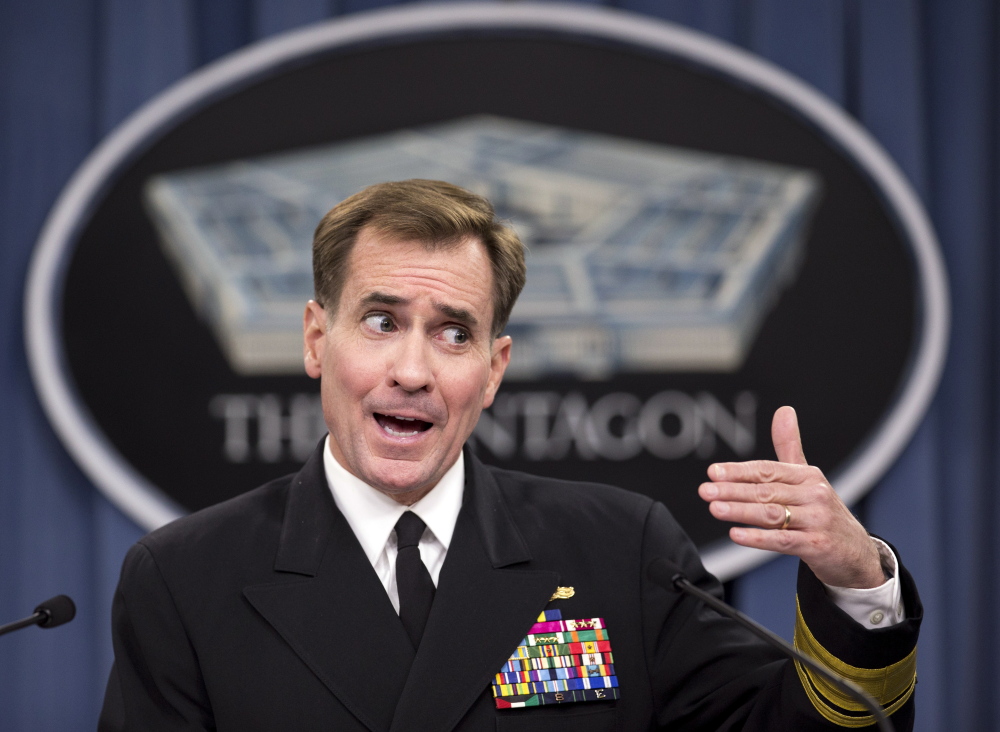WASHINGTON — President Obama authorized Defense Secretary Chuck Hagel on Friday to send up to 1,500 more U.S. troops to Iraq, roughly doubling the force the United States has built up since June to fight the Islamic State militants who control much of Iraq and Syria.
The announcement of a major increase in the force in Iraq deepens U.S. involvement in a messy regional conflict that officials are warning may last for years. The White House said it would request $5.6 billion for the military campaign against the Islamic State, including $1.6 billion to train and equip Iraqi troops.
The additional U.S. troops will expand a military advisory mission in Iraq that began in the summer and will establish a new effort to train Iraqi forces, Rear Adm. John Kirby, the Pentagon’s press secretary, told reporters.
The expansion of the U.S. military footprint in Iraq, nearly three years after Obama ended the last American war there, also underscores the severity of the threat U.S. officials see in the Islamic State, a well-armed extremist group that has drawn strength from the conflict in Syria and has used brutal tactics to expand its realm across Iraq and Syria.
In response to that threat, Obama had established a renewed military presence in Iraq of 1,400 troops, significantly increasing a security footprint that since the 2011 withdrawal had included only a small security assistance office attached to the U.S. Embassy.
Officials said they hoped that lawmakers would approve the funding for the new troop plan in the coming weeks.
U.S. officials said that, under the new plan, U.S. Central Command would establish two additional hubs for U.S. military advisers, who have been working alongside Iraqi officials since the summer as they oversee Iraqi efforts to expel the Islamic State from the country.
One will be in western Anbar province, which has been partly controlled by Islamic State militants for about a year, and the second will be north of Baghdad.
Central Command would also establish training sites for Iraqi forces in several locations in the northern, western and southern parts of the country, including ethnically mixed Diyala province. Since the return of U.S. troops to Iraq in the summer, they had previously been confined mostly to Baghdad and Irbil in the north.
Ensuring Iraqi security forces are capable and willing to fight is critical to the Obama administration’s Iraq strategy, five months after Iraqi forces fled en masse in the face of an Islamic State assault in the north. It is equally important because Obama has pledged he will not allow U.S. soldiers to return to combat in Iraq.
Kirby said the U.S. military would train 12 brigades, including nine Iraqi army brigades and three brigades of pesh merga, the Kurdish fighters who have long defended Iraq’s largely autonomous Kurdish region in Iraq’s north.
The new training mission in Iraq echoes a much larger effort that the United States initiated after its invasion of Iraq in 2003. That years-long endeavor, which rebuilt Iraqi forces largely from scratch, cost the United States over $20 billion.
While American military leaders complain Iraqi forces were neglected after the U.S. departure, they hope that Iraq’s new Prime Minister, Haider al-Abadi, will install military leaders who can restore Iraqi forces’ ability to take on a sophisticated, well-armed group like the Islamic State.
Yet as the conflict continues, Iraqi troops continue to struggle to retake territory controlled by the Islamic State in key areas such as the Baiji oil refinery. U.S. military officials don’t expect Iraqi forces to be able to reclaim Mosul, Iraq’s second largest city, until next year.
While the Obama administration is expanding its effort against the Islamic State, it has resisted calls from some of its Middle Eastern allies to more directly pressure Syrian President Bashar al-Assad, whose long civil conflict has created the conditions that gave birth to Islamic State and other extremist groups.
The Pentagon is preparing to launch a training program for some moderate Syrian rebels, but officials say the initial objective is to empower the Syrians to fight extremists, rather than to topple Assad.
Kirby said the new training could take six to seven months once it begins. Trainers from other countries, including Denmark, are also expected to take part.
Sunni tribesmen, who U.S. and Iraqi officials have been hoping will rise up against fellow Sunnis in the Islamic State, could also be trained by American soldiers, Kirby said.
The troop increase comes as U.S. and allied warplanes continue their strikes on militant targets in Iraq and Syria. While most of those strikes have targeted the Islamic State, U.S. aircraft have twice conducted attacks on the Khorasan group, an al-Qaida affiliate that U.S. officials said was plotting to attack the West.
Send questions/comments to the editors.



Success. Please wait for the page to reload. If the page does not reload within 5 seconds, please refresh the page.
Enter your email and password to access comments.
Hi, to comment on stories you must . This profile is in addition to your subscription and website login.
Already have a commenting profile? .
Invalid username/password.
Please check your email to confirm and complete your registration.
Only subscribers are eligible to post comments. Please subscribe or login first for digital access. Here’s why.
Use the form below to reset your password. When you've submitted your account email, we will send an email with a reset code.